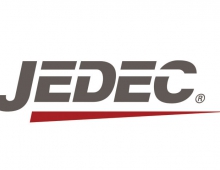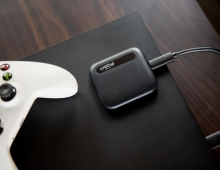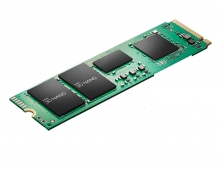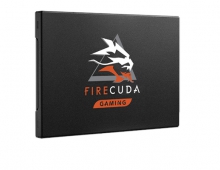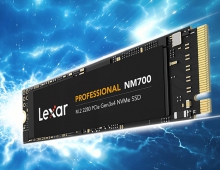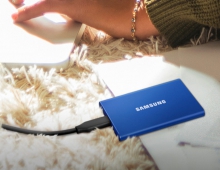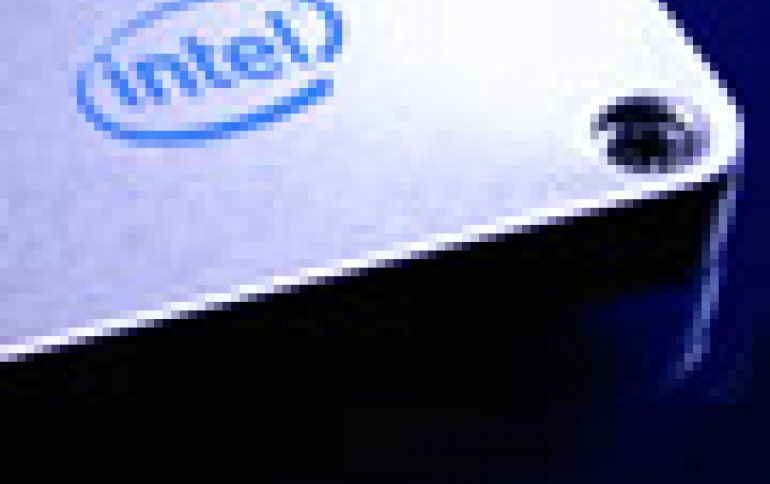
Intel's SSDs Excel In Comparison Tests
Intel's X25-M SSD 80GB and X25-M SSD 160GB solid state drives reanked first in a series of benchmarks performed by DRAMeXchange.
A total of 40 SSD products were listed in the evaluation, mostly MLC SSDs with capacities of 64GB and 128GB. In the evaluation, researcher DRAMeXchane Technology, compared the differences between SLC NAND Flash and MLC SSD, as well as the differences between SSD controllers.
Although some of the SSD controllers were supplied by the same vendors, different sources of NAND Flash also resulted in the differences in their performance. Another factor affecting the performance is the SSD firmware itself; each individual vendor has its own method of optimizing their firmware, DRAMeXchange said.
Nand Flash chips used in the SSD are divided into higher priced SCL, and lower-priced MLC. The former is suitable for writing data, while the latter shows better performance in reading data; the downside of the MLC is its shorter lifespan and that it requires SSD controller to provide better algorithms to enable MLC SSD Flash chips to write data uniformly, in order to extend its service life.
Theoretically, the current algorithm framework allows it to remain operational for a good few years.
Reading performance of MLC SSD is generally good; reading speed of 200MB~260MB per second is already one of the most important requirements of SSD products in 2010, DRAMeXchange said.
As for writing performance, SLC SSDs are still faster, achieving >200MB per second. However, in DRAMeXchange's 1H2010 evaluation, there were also MLC SSDs that were capable of reaching writing speed of 200MB per second.
In the evaluation, DRAMeXchange found out that in the efficiency of SSD controllers, in addition to Intel and Samsung?s Flash which are produced in-house, others such as SandForce, Indilinx, JMicron also performed well.
Among them, SSDs featuring SandForce chip generally do not have built-in DRAM cache. The new design enables the SSD to rival against SSDs with DRAM cache and Indilinx, JMicron controllers.
As the writing time of Flash memory chips is limited to between thousand of times to ten thousand times, many may be concerned about the lifespan of Flash memory based SSDs. Considering this fact, manufacturers have adopted the algorithm which takes account of the storage times and detritions of different areas of the chip, and have established the balanced quality subject to the written data, preventing the over-writing of specific zone of the chip.
The SSD also features data-preservation during power failure, coupled with wear leveling technology, users can be more assured of the data security.
It can be seen in all the tests that the major difference among the SSD products is in the writing and reading efficiency. First, the efficiency of different Flash chips adopted ? though all are MLC NAND Flash, the performance of the chips can influence the overall SSD efficiency. Second, the controller chip adopted and the size of Cache also have an impact on the SSD efficiency.
As to the TRIM instructions of Windows 7, the supporting SSD is able to directly delete FLASH-stored data to release free block, which in turn reduces SSD block processing time, enables immediate writing into the system, and enhances writing speed. DRAMeXchange said also found that the writing rate of new generation SSDs improved remarkably, making better progress than the reading rate.
According to the test data, many products achieved the transfer rate on their labels.
On the whole, 2.5 inch mainstream SSD products are suitable for commercial notebook users, as well as desktop users who require higher efficiency. However, the SSD price and mainstream storage capacity are still far from traditional hard disks on the market. For users, purchasing the combination of SSDs as the system?s main hard disk/boot disk and traditional hard disks special for massive data storage may well be an effective balance between efficiency and cost.
The price gap of NAND flash is still quite substantial in 2010. With advancements in the manufacturing process of flash chip providers, and the increase in their output, the cost of SSD has been declining. Currently, SSD is increasingly more popular than they were in 2008 and 2009.
In terms of capacity and performance, Intel offers highly-competitive products. Additionally, Intel?s NAND Flash chips are 34 nm products which are far more cost-competitive than non-Intel products, DRAMeXchange found. However, memory module manufacturer and brand manufacturers have also launched SSD products that rival with the Intel variants.
In terms of existing SSD controllers, semiconductor design companies such as JMicron, SandForce, and Indilinx, as well as flash chip providers, will be unveiling 3X nm NAND Flash chips in Q2 2010.
Moreover, non-Intel flash chip providers will also introduce 3X-nm flash SSD controller chips. It is estimated that more SSDs that adopt 3X-nm flash chips will be launched by the end of 2010. At that time, SSD prices may decline by about 20%. As for Intel, the company will still offer 25-nm products in 2011, which are expected to further reduce SSD costs by about 20%, taking the SSD competition in 2011 to new heights.
As for the overall market, more affordable SSD prices and higher consumer acceptance are spurring the overall development of the SSD industry, and providing broader export channel for NAND Flash vendors? newly established capacity.
64GB SSD evaluation ? performance rankings
The 64GB category is the acceptable price range by general consumers. Of the 20 varieties of SSDs in the evaluation, DRAMeXchange selected 10 products which excel in overall performance, specifications, and have superior product quality. The recommended products are as follows:
1, Intel X25-M SSDSA2M080G2GC 80GB
2, OCZ Agility EX 60GB SSD
3, KingFast KF251MCI 64GB SSD
4, A-Data SSD S592 64GB
5, STAREX 64GB SSD
6, Gingle V3 64GB SSD
7, PQI SSD S528 64GB
8, CORSAIR CMFSSD-64GBG2D P64 SSD
9, RiDATA X-series NSSD-X25-64-C07M-PN 64GB SSD
10, RunCore RCP-IV-S2564-C 64GB SSD
In this 64GB MLC SSD evaluation, DRAMeXchange also selected top performers in each criteria, including:
Best performance/price ratio: A-Data SSD S592 64GB
Best overall transmission efficiency: OCZ Agility EX 60GB SSD
Best high-speed writing: KingFast KF251MCI 64GB SSD
Best system boot disk: Intel X25-M SSDSA2M080G2GC 80GB
Best high-load IO: CORSAIR CMFSSD-64GBG2D P64 SSD
128GB SSD evaluation ? performance rankings
The 128GB category is the acceptable price range by gamers and enterprise users. Of the 20 varieties of SSDs in the evaluation, DRAMeXchange selected 10 products which excel in overall performance, specifications, and have superior product quality. The capacity of these products is suitable for use as the primary hard disk, and their overall system efficiency is also quite impressive. The recommended products are as follows:
1, Intel X25-M SSDSA2M160G2GC 160GB
2, OCZ Vertex PRO 120GB SSD
3, A-Data SSD S599 100GB
4, G.SKILL PHOENIX 100GB SSD
5, MX-Technology MXSSD2MDS 100GB SSD
6, Micron REALSSD C300 128GB
7, STAREX 128GB SSD
8, Apogee Mars FlashSSD 128GB
9, CORSAIR CMFSSD-128GD1 X128 SSD
10, SUPER Sspeed SSD 128GB
Furthermore, in this 128GB MLC SSD evaluation, DRAMeXchange also selected top performers in each criteria, including:
Best performance/price ratio: CORSAIR CMFSSD-128GD1 X128 SSD
Best overall transmission efficiency: OCZ Vertex PRO 120GB SSD
Best high-speed writing: G.SKILL PHOENIX 100GB SSD
Best system boot disk: Intel X25-M SSDSA2M080G2GC 80GB
Best high-load IO: A-Data SSD S599 100GB
Although some of the SSD controllers were supplied by the same vendors, different sources of NAND Flash also resulted in the differences in their performance. Another factor affecting the performance is the SSD firmware itself; each individual vendor has its own method of optimizing their firmware, DRAMeXchange said.
Nand Flash chips used in the SSD are divided into higher priced SCL, and lower-priced MLC. The former is suitable for writing data, while the latter shows better performance in reading data; the downside of the MLC is its shorter lifespan and that it requires SSD controller to provide better algorithms to enable MLC SSD Flash chips to write data uniformly, in order to extend its service life.
Theoretically, the current algorithm framework allows it to remain operational for a good few years.
Reading performance of MLC SSD is generally good; reading speed of 200MB~260MB per second is already one of the most important requirements of SSD products in 2010, DRAMeXchange said.
As for writing performance, SLC SSDs are still faster, achieving >200MB per second. However, in DRAMeXchange's 1H2010 evaluation, there were also MLC SSDs that were capable of reaching writing speed of 200MB per second.
In the evaluation, DRAMeXchange found out that in the efficiency of SSD controllers, in addition to Intel and Samsung?s Flash which are produced in-house, others such as SandForce, Indilinx, JMicron also performed well.
Among them, SSDs featuring SandForce chip generally do not have built-in DRAM cache. The new design enables the SSD to rival against SSDs with DRAM cache and Indilinx, JMicron controllers.
As the writing time of Flash memory chips is limited to between thousand of times to ten thousand times, many may be concerned about the lifespan of Flash memory based SSDs. Considering this fact, manufacturers have adopted the algorithm which takes account of the storage times and detritions of different areas of the chip, and have established the balanced quality subject to the written data, preventing the over-writing of specific zone of the chip.
The SSD also features data-preservation during power failure, coupled with wear leveling technology, users can be more assured of the data security.
It can be seen in all the tests that the major difference among the SSD products is in the writing and reading efficiency. First, the efficiency of different Flash chips adopted ? though all are MLC NAND Flash, the performance of the chips can influence the overall SSD efficiency. Second, the controller chip adopted and the size of Cache also have an impact on the SSD efficiency.
As to the TRIM instructions of Windows 7, the supporting SSD is able to directly delete FLASH-stored data to release free block, which in turn reduces SSD block processing time, enables immediate writing into the system, and enhances writing speed. DRAMeXchange said also found that the writing rate of new generation SSDs improved remarkably, making better progress than the reading rate.
According to the test data, many products achieved the transfer rate on their labels.
On the whole, 2.5 inch mainstream SSD products are suitable for commercial notebook users, as well as desktop users who require higher efficiency. However, the SSD price and mainstream storage capacity are still far from traditional hard disks on the market. For users, purchasing the combination of SSDs as the system?s main hard disk/boot disk and traditional hard disks special for massive data storage may well be an effective balance between efficiency and cost.
The price gap of NAND flash is still quite substantial in 2010. With advancements in the manufacturing process of flash chip providers, and the increase in their output, the cost of SSD has been declining. Currently, SSD is increasingly more popular than they were in 2008 and 2009.
In terms of capacity and performance, Intel offers highly-competitive products. Additionally, Intel?s NAND Flash chips are 34 nm products which are far more cost-competitive than non-Intel products, DRAMeXchange found. However, memory module manufacturer and brand manufacturers have also launched SSD products that rival with the Intel variants.
In terms of existing SSD controllers, semiconductor design companies such as JMicron, SandForce, and Indilinx, as well as flash chip providers, will be unveiling 3X nm NAND Flash chips in Q2 2010.
Moreover, non-Intel flash chip providers will also introduce 3X-nm flash SSD controller chips. It is estimated that more SSDs that adopt 3X-nm flash chips will be launched by the end of 2010. At that time, SSD prices may decline by about 20%. As for Intel, the company will still offer 25-nm products in 2011, which are expected to further reduce SSD costs by about 20%, taking the SSD competition in 2011 to new heights.
As for the overall market, more affordable SSD prices and higher consumer acceptance are spurring the overall development of the SSD industry, and providing broader export channel for NAND Flash vendors? newly established capacity.
64GB SSD evaluation ? performance rankings
The 64GB category is the acceptable price range by general consumers. Of the 20 varieties of SSDs in the evaluation, DRAMeXchange selected 10 products which excel in overall performance, specifications, and have superior product quality. The recommended products are as follows:
1, Intel X25-M SSDSA2M080G2GC 80GB
2, OCZ Agility EX 60GB SSD
3, KingFast KF251MCI 64GB SSD
4, A-Data SSD S592 64GB
5, STAREX 64GB SSD
6, Gingle V3 64GB SSD
7, PQI SSD S528 64GB
8, CORSAIR CMFSSD-64GBG2D P64 SSD
9, RiDATA X-series NSSD-X25-64-C07M-PN 64GB SSD
10, RunCore RCP-IV-S2564-C 64GB SSD
In this 64GB MLC SSD evaluation, DRAMeXchange also selected top performers in each criteria, including:
Best performance/price ratio: A-Data SSD S592 64GB
Best overall transmission efficiency: OCZ Agility EX 60GB SSD
Best high-speed writing: KingFast KF251MCI 64GB SSD
Best system boot disk: Intel X25-M SSDSA2M080G2GC 80GB
Best high-load IO: CORSAIR CMFSSD-64GBG2D P64 SSD
128GB SSD evaluation ? performance rankings
The 128GB category is the acceptable price range by gamers and enterprise users. Of the 20 varieties of SSDs in the evaluation, DRAMeXchange selected 10 products which excel in overall performance, specifications, and have superior product quality. The capacity of these products is suitable for use as the primary hard disk, and their overall system efficiency is also quite impressive. The recommended products are as follows:
1, Intel X25-M SSDSA2M160G2GC 160GB
2, OCZ Vertex PRO 120GB SSD
3, A-Data SSD S599 100GB
4, G.SKILL PHOENIX 100GB SSD
5, MX-Technology MXSSD2MDS 100GB SSD
6, Micron REALSSD C300 128GB
7, STAREX 128GB SSD
8, Apogee Mars FlashSSD 128GB
9, CORSAIR CMFSSD-128GD1 X128 SSD
10, SUPER Sspeed SSD 128GB
Furthermore, in this 128GB MLC SSD evaluation, DRAMeXchange also selected top performers in each criteria, including:
Best performance/price ratio: CORSAIR CMFSSD-128GD1 X128 SSD
Best overall transmission efficiency: OCZ Vertex PRO 120GB SSD
Best high-speed writing: G.SKILL PHOENIX 100GB SSD
Best system boot disk: Intel X25-M SSDSA2M080G2GC 80GB
Best high-load IO: A-Data SSD S599 100GB

